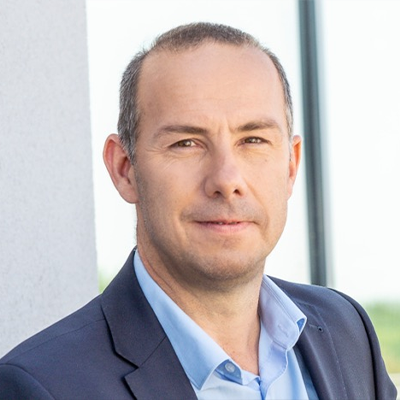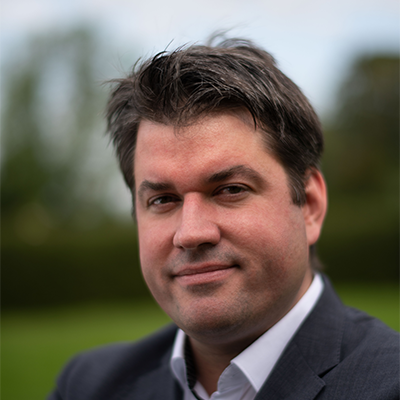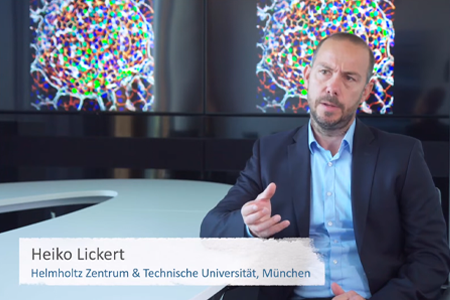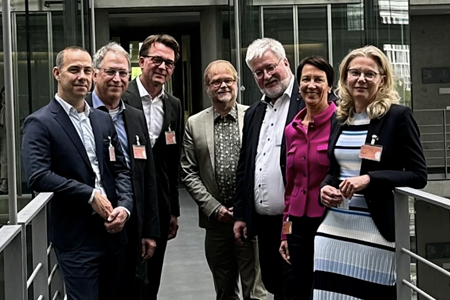What if we can cure diabetes?
We are on the way to finally fighting the cause of the disease – and not just the symptoms.
Viacure GmbH is declaring war on the widespread type 2 diabetes.
We are convinced that we can treat the cause of this widespread disease with the regeneration therapy we have developed. This is based on new, sound scientific findings: the discovery of a new type of insulin-inhibiting receptor and therapeutic antibodies that regenerate the insulin-producing cells.
Our company
Paradigm shift in type 2 Diabetes treatment
Paradigm shift in type 2 Diabetes treatment
Viacure GmbH was notarized as a spin-off of Helmholtz Munich in May 2023 to develop new therapies against type 2 diabetes.
Vision
Our therapies have the potential to directly combat one of the most serious diseases. For many of those affected, we are developing the prospect of using our new treatment approach – compared to conventional treatment options, we are developing a completely new perspective for those affected with our new treatment approach: alleviating the consequences of diabetes by combating the cause and not just the symptoms.
Mission
We are creating a paradigm shift in diabetes treatment. We will make the latest scientific findings available to diabetes sufferers in the form of therapies and medicines. Our mission is to transform theory into practice.
Sources: International Diabetes Federation (IDF), German Diabetes Society and Robert Koch Institute
95%
0
1,5 mio.
No current medication
can maintain blood sugar control.
are treated
with insulin.
40 – 50%
!
This leads to serious
complications such as
heart attack, stroke, kidney failure, blindness and many more.
The potentialis extraordinary
The potentialis extraordinary
95%
of all diabetes
in Germany
is type 2 diabetes
0
No current medication
can maintain
blood sugar control.
1,5 mio.
are treated
with insulin.
40- 50%
!
Sources: International Diabetes Federation (IDF), German Diabetes Society and Robert Koch Institute
Founding teamwith in-depth expertise

Scientific Director: Prof. Dr. Heiko Lickert
Dr. Heiko Lickert is Director of the Institute for Diabetes and Cell Regeneration Research at Helmholtz Munich. Prof. Lickert is one of the world’s leading scientists in the field of cell regeneration.

Managing Director: Dr. Nikolas Uez
Dr. Nikolas Uez is extensively active as an entrepreneur after his research time on developmental genetics at Helmholtz Munich.

Head of the Technology Department: Dr. Wolfgang Burger
Dr. Wolfgang Burger is the founder and manager of a Contract Development and Manufacturing Organization (CDMO) and has over 30 years of expertise in the pharmaceutical industry with a focus on development and manufacturing.

Scientific project manager: Dr. Carolina Ballester-Lopez
Dr. Carolina Ballester-López has more than eleven years of research experience in cell biology and immunology, including more than three years in therapeutic antibody development at Roche Pharma (pRED).
From cutting-edge research to application
As early as 2021, a research team led by Prof. Heiko Lickert from Helmholtz Munich discovered the insulin-inhibitory receptor “Inceptor” and its role as an inhibitor of the insulin signaling pathway.
Inceptor and the insulin receptor are both located on the surface of beta cells, whereby Inceptor can block the insulin receptor and thus reduce the insulin sensitivity of the cells. This weakens the signaling pathway. A recent study goes even further: it shows that inceptor binds excess insulin in the beta cell and directs it for degradation. The increased presence of inceptor in beta cells suggests that the receptor plays a role in insulin secretion, which is controlled by beta cells. This process is often impaired in diabetes, leading to a rise in blood glucose levels. By blocking Inceptor, the researchers were able to replenish the insulin stores of beta cells, improve the release of insulin and prevent beta cell death. Blocking inceptor could help to boost insulin production and protect beta cells, particularly in cells that are already damaged.
In order to advance the development of drugs that specifically block inceptors and thereby protect or regenerate beta cells, preclinical studies that test the safety and efficacy of these innovative therapeutic approaches are the next step. Viacure has set itself the goal of paving the way for clinical trials and thereby making a decisive contribution to the treatment or even cure of diabetes.
A Scientific Advisory Board that is second to none

Prof. Dr. Annette Ziegler

Prof. Dr. Timo Müller

Prof. Dr. Andreas Birkenfeld
Common disease diabetes
One of the most serious diseases worldwide
The health consequences are considerable
High economic damage
537 million people worldwide are affected by diabetes.
537 mio.
Every 5th death in Germany is due to diabetes
5.
780 mio.
966 bio.
Global healthcare expenditure is around USD 966 trillion (2021)
5 sec.
8.9 million
0,7%
39 trillion
Common disease diabetes
One of the most serious diseases worldwide
- 537 million people worldwide are affected by diabetes.
- By 2045, 780 million patients are forecast.
- In Germany, 8.9 million people suffer from diabetes, and 450,000 more are diagnosed every year.
- The number of people with diabetes in Germany will grow by 0.7% annually until 2029.
The health consequences are considerable
- One person dies of diabetes every 5 seconds worldwide
- Every 5th death in Germany is due to diabetes
High economic damage
- Global healthcare expenditure is around USD 966 trillion (2021)
- German healthcare expenditure is around 39 trillion dollars (2023)
Sources: International Diabetes Federation (IDF), German Diabetes Society and Robert Koch Institute
Our approach
Pioneers in tackling the causes of the disease
Clinical studies show: No single drug to lower blood glucose levels can currently maintain blood glucose control caused by the progressive decline of beta cells. Therefore, insulin therapy must replace the function of the beta cells (i.e. glucose measurement and insulin secretion), which corresponds to pure symptom control. Unfortunately, insulin replacement therapy can only control glucose regulation artificially and inadequately, which leads to subsequent complications. The ß cell fails due to insulin resistance. By blocking the inceptor, the insulin resistance can be counteracted and the ß cell regenerated. This leads to a causal treatment of type 2 diabetes and a natural maintenance of blood sugar control.
Thanks to its novel mechanism of action, Viacure’s therapeutic procedure represents a paradigm shift from symptomatic to causal diabetes therapy.
Fundamental medical advantages
The main advantage of the therapy is the maintenance of ß -cell function and natural control of blood glucose regulation to prevent secondary complications.
With conventional insulin replacement therapy, it is not possible to closely control blood glucose levels and there is a risk of successive weight gain or life-threatening hypoglycemia in the patient.
Although the slimming injection (GLP-1 analogs / incretin therapy) leads to weight reduction during the administration phase (but not permanently), it cannot achieve the sustained control of blood glucose levels required for the treatment of type 2 diabetes.
For investors
With causal therapy, we can stop or reverse the course of the disease. In doing so, we assume that the therapy will be successful in the long term, which, due to the form of administration and avoidance of subsequent complications, will not only bring about an enormous improvement in the patient’s quality of life, but also avoid subsequent costs for the healthcare system.
It can therefore be assumed that a drug developed on the basis of our patented process will meet with great demand and thus also with great interest from potential investors at every stage of development.
Your contact for investments at Viacure:
Carolina Ballester-Lopez
Enormous economic potential
News
Strong national and international recognition
- The Diabetes information portal: ‘Inceptor’ receptor: Key to new diabetes therapies?
- German Center for Diabetes Research: Inceptor regulates insulin balance: New approach for diabetes therapies
- Technical University of Munich: New approach for diabetes therapy
- Science Daily: Inceptor regulates insulin homeostasis: A new approach for diabetes therapies
- Medical Xpress: 'Inceptor' that regulates insulin homeostasis offers new approach for diabetes therapies
Most important successes and publications
- Helmholtz Munich press release: Inceptor Regulates Insulin Homeostasis: A New Approach for Diabetes Therapies.
- Publication: Siehler, Johanna, et al. "Inceptor binds to and directs insulin towards lysosomal degradation in β cells." Nature Metabolism (2024): 1-17
- BavarianBiotechCluster Development (BioM): m4 Award winner Prof. Lickert receives ERC Grant for diabetes research (2022)
- Helmholtz Munich press release: Scientists Discover a Promising New Target for Diabetes Treatment
- Publication: Ansarullah, et al. "Inceptor counteracts insulin signalling in β-cells to control glycaemia." Nature 590.7845 (2021): 326-331.
Further publications
- Grandl, Gerald, et al. "Global, neuronal or β cell-specific deletion of inceptor improves glucose homeostasis in male mice with diet-induced obesity." Nature Metabolism 6.3 (2024): 448-457
- Helmholtz Munich press release: Understanding Diabetes: Single-Cell Atlas Leverages Machine Learning to Decipher Diabetes at the Molecular Level
- Hrovatin, Karin, et al. "Delineating mouse β-cell identity during lifetime and in diabetes with a single cell atlas." Nature metabolism 5.9 (2023): 1615-1637
- Jain, Chirag, et al. "Targeting pancreatic β cells for diabetes treatment." Nature Metabolism 4.9 (2022): 1097-1108.



